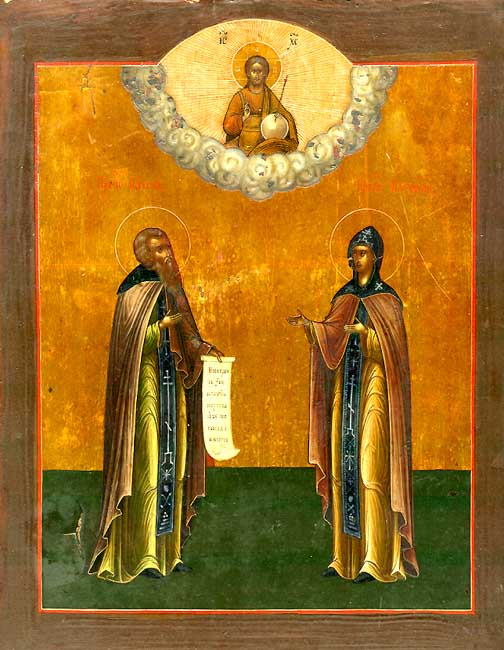 She was born in Pamphylia in Asia Minor (present-day Türkiye) in the middle of the fifth century AD. She got married when she was three or fourteen years old and gave birth to a daughter. She tended to a life of prayer since her early youth, especially after she met a pious woman in Constantinople. Her husband tried to distract her from what he considered her excessive piety, to the point that he forbade her from leaving the house sometimes. She remained patient until the day came when she arranged for her daughter, and she dressed as a man and fled from home to the Monastery of Saint Bassian in Constantinople. They accepted her because they thought she was a eunuch. It was not long after she became a monk until the abbot of the monastery found out about her.
She was born in Pamphylia in Asia Minor (present-day Türkiye) in the middle of the fifth century AD. She got married when she was three or fourteen years old and gave birth to a daughter. She tended to a life of prayer since her early youth, especially after she met a pious woman in Constantinople. Her husband tried to distract her from what he considered her excessive piety, to the point that he forbade her from leaving the house sometimes. She remained patient until the day came when she arranged for her daughter, and she dressed as a man and fled from home to the Monastery of Saint Bassian in Constantinople. They accepted her because they thought she was a eunuch. It was not long after she became a monk until the abbot of the monastery found out about her.
He knew God's blessing on her soul, but he feared for his monastery, so he deported her to a nunnery in Homs. There, Matrona became established in a life of virtue. When her fame spread, she fled to Jerusalem and from there to Beirut, so that false glory would not hurt her soul.
In Beirut, Matrona took refuge in a pagan temple. There she was faced with many trials, but fear did not creep into Matrona’s heart, by the grace of God, who remained steadfast in prayer. She withstood every temptation, struggling in perpetual prayer and glorification. Then some pagan Beiruti women began approaching her in astonishment, and began asking to be baptized and join her banner. Matrona lived in Beirut, accompanied by nine female students, for months or perhaps years.
From Beirut, Matrona returned to Constantinople and resided in a cell near the Monastery of Saint Bassian. Then, after a while, she summoned her nuns from Beirut. It seems that her fame spread again, in a short time, and pious women, especially from the noble class, began flocking to her to benefit from her guidance and receive her blessing. Several noble women left the world and came to live a life of poverty and obedience under its wings. These women carried with them money and huge gifts, which the saint used to build a monastery that soon became one of the most important monasteries in the city. Matrona lived for nearly a hundred years.
The Holy Church returns to her on the ninth of November.
Troparia in the eighth tune
Through you, you were preserved with close care, O Mother Matrona, because you carried the cross and followed Christ, and you worked and taught that the mother of the body should be overlooked because it passes away, and the matters of the immortal soul should be concerned. Therefore, O righteous one, your soul rejoices with the angels.
Qandaq with the second tune
When you exhausted your body, O Matrona, with fasts, while you were dwelling among men, persevering in prayers, you served the Lord in a divine state, for whose sake you neglected all things, devoting your life with righteousness.


